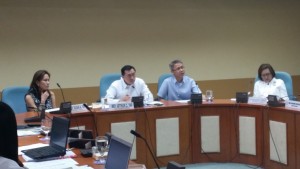 A two-year moratorium on the real property tax could be the additional tax relief that victims of calamities need and lifting tax obligations on donations could encourage more to help during the hard times.
A two-year moratorium on the real property tax could be the additional tax relief that victims of calamities need and lifting tax obligations on donations could encourage more to help during the hard times.
This prompted Third District Rep. Arthur Yap to file House Bill 5827 that seeks to provide tax relief during times of calamity that would pave for the Calamity Tax Relief Act of 2015 if enacted into law.
Often, natural calamities such as earthquakes, typhoons, volcanic eruptions and massive floods cause massive and widespread economic losses resulting to damage to properties, Yap said.
“To alleviate the sufferings of the victims of calamities, there is a need to grant them a reasonable relief from their tax liabilities on their real properties affected by the calamity within a specified period of time to accelerate their pace of economic recovery,†Yap explained.
Under the current tax laws, only individuals or corporations engaged in trade or business or practice of profession can avail of relief for losses as a result of calamities, he cited.
“Losses of property used in trade or business, resulting from fires, storms or other casualties, that are actually sustained during the taxable year and not compensated for by insurance or other forms of indemnity can be claimed as deductions for income tax purposes,†according to Yap.
Moreover, the “amount of the deductible casualty loss is limited to the difference between the value of the property immediately preceding the casualty and its value thereafterâ€.
“This bill seeks to grant additional tax relief to victims of calamities in the form of real property tax moratorium in the affected areas for two fiscal years from the date of declaration of a state of calamity by the proper local sanggunian,†Yap proposed.
He proposed that the moratorium covers residential lands and buildings, commercial and industrial buildings, agricultural lands together with the plants and growing fruit trees in the area, and permanently installed machineries intended by the owners of the buildings or structures for an industry or business which may be carried on therein.
DONATIONS
Yap also emphasized that while the government depends upon the collection of taxes to be able to deliver service to the people, “the government must also be sensitive to the needs of victims of natural calamities and assist in the alleviation of their serious economic dislocationsâ€.
He proposed, through the bill, that the Value-Added Tax (VAT) on the foreign aid would instead be shouldered by the Philippine government through budget reports and the tax expenditure fund from the General Appropriations Act.
“Foreign assistance pouring in for victims of calamities are exempt from taxes and import duties if channeled through certain government agencies and state-accredited groups under Section 18 of Republic Act 10121 or the Philippine Disaster Risk Reduction and Management Act of 2010, in conjunction with Section 105 of the Tariff and Customs Code of the Philippines as amended,†Yap cited.
For local donations, they are “exempt from donor tax and deductible as an expense if properly accredited by the DSWDâ€.
“This bill seeks to liberalize the requirements for the grant of donations, whether foreign or local, by simply requiring the declaration of a state of calamity by the proper sanggunian of the areas affected by calamities for the donations to be exempt from all types of taxes,†Yap added.
The donations should be properly certified by the DSWD for monitoring by the government.
“Tax exemptions on donations and assistance given to victims of calamities will further encourage donors and ensure a steady flow of donations to the victims,†he added.(Angeline Valencia)

Be First to Comment